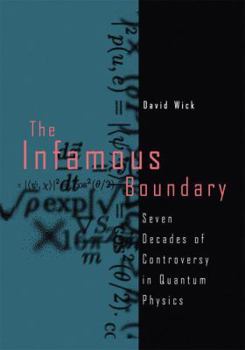The Infamous Boundary: Seven Decades of Controversy in Quantum Physics
Select Format
Select Condition 
Book Overview
reprinted in the British trade journal Physics World in 1990, three separate and 5 lengthy replies from establishment physicists were printed in subsequent issues. For outsiders, especially scientists who rely on physicist's theories in their own fields, this situation is disquieting. Moreover, many recall their introduction to quantum mechanics as a startling, if not shocking, experience. A molecular biologist related how he had started in theoretical...
Format:Paperback
Language:English
ISBN:1461253632
ISBN13:9781461253631
Release Date:November 2011
Publisher:Birkhauser
Length:244 Pages
Weight:1.01 lbs.
Dimensions:0.6" x 7.0" x 10.0"
Customer Reviews
4 ratings
Great book
Published by Thriftbooks.com User , 23 years ago
This lucid book is one of the first that really ridiculizes all the paranoid proponents of the various interpretentional dogma that infest and plague quantum mechanics. Bravo, David!
Excellent historical review, redressing the balance...
Published by Thriftbooks.com User , 24 years ago
A detailed historical analysis of the Einstein-Bohr debate covering all the contemporary and subsequent contributors and concentrating mainly on the EPR controversy, Bell's theorem and the experimental tests to date. Convincingly overturns the still prevailing myth that Bohr 'won' the argument by refuting Einstein's scepticism. This falsehood was propagated by Bohr's numerous and overenthusiastic disciples and unfortunately has been perpetuated ever since in virtually all the standard QM textbooks. In fact, as Wick's extensive quotations and commentary show, it was Einstein's arguments that were presented with great clarity and rigour, whereas Bohr was unable to confront them directly and invariably relied on metaphysical and psychological waffle to cloud the issue. It is quite clear from the numerous extracts from Bohr's responses that not only could none of his contemporaries understand what he was talking about but that he didn't either! One weakness is Wick's rather confusing explanation of the probabilities involved in Bell's theorem which have been much better presented elsewhere (eg. in Mermin's book or in Penrose - 'The Emperor's New Mind'), but this is more than compensated by the excellent lengthy appendix by William Faris that gives the clearest analysis of Bell's theorem I have seen so far.
Creative-Inventive Physics
Published by Thriftbooks.com User , 24 years ago
David Wick's book is the best book that I have seen on jargon in quantum physics, and I have been publishing and lecturing on the topic for quite a while. He shows step by step how some of the greatest abstract geniuses including Heisenberg and Bohr but also most of the quantum mainstream geniuses get carried away by their own importance and talent into coining and believing gibberish and jargon including complementarity. I might add that the statistics establishment, both in physics and mathematics, especially the Bayesians, are generally about as bad. These geniuses will not even publish any ideas not using their exact jargon and current fads. An advanced civilization would probably have an inventors-creative department to remedy this, but try telling this either to government or corporations!
A great exposition of the quantum controversy
Published by Thriftbooks.com User , 26 years ago
This book is by far the best layman's description I have read of the controversy surrounding Quantum Physics. After honestly stating his own position in the debate (against the Copenhagen Orthodoxy), Wick introduces the main points of the controversy by describing how the theory was developed and the scientific and phylosophical backgrounds of its creators. Good descriptions of issues such as complementarity, the uncertainty principle, the measurement problem, and the problem of properties make this book particularly informative. Specially interesting is Wick's description of the line of debate started by the EPR experiment, continued by such great scientists as Bohm and Bell, and not yet completed. The only thing that I miss is a good discussion of the supperposition principle.Wick's book is written very clearly, and while it does not require previous knowledge of the subject, it is full of strictly scientific information. You will not find here any pseudoscientific speculations on paranormal phenomena nor religion, which are so common in other popular books on the subject. On the other hand, the science and its interpretations are very well illustrated by clear descriptions and historical anecdotes which make the book a relatively easy read.After reading about this subject from books as diverse as Popper's "Quantum Theory and the schism in physics" and Gribbin's "In search of Schrodinger's Cat", I was very impressed with Wick's ability to produce this engaging, accurate and though-provoking portrait of the longstanding discussion on quantum theory and its relation to how reality might be.





